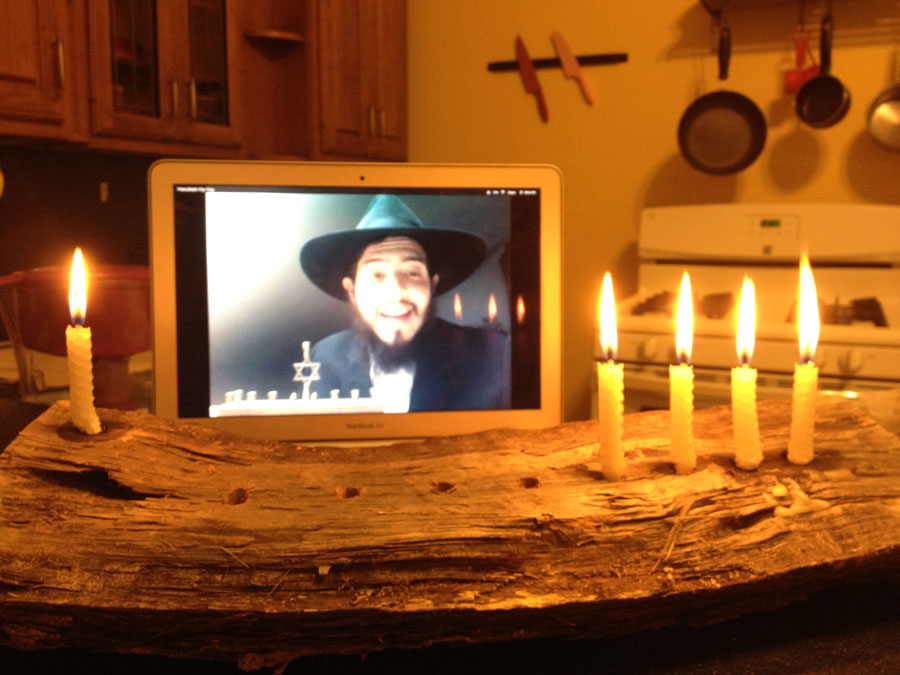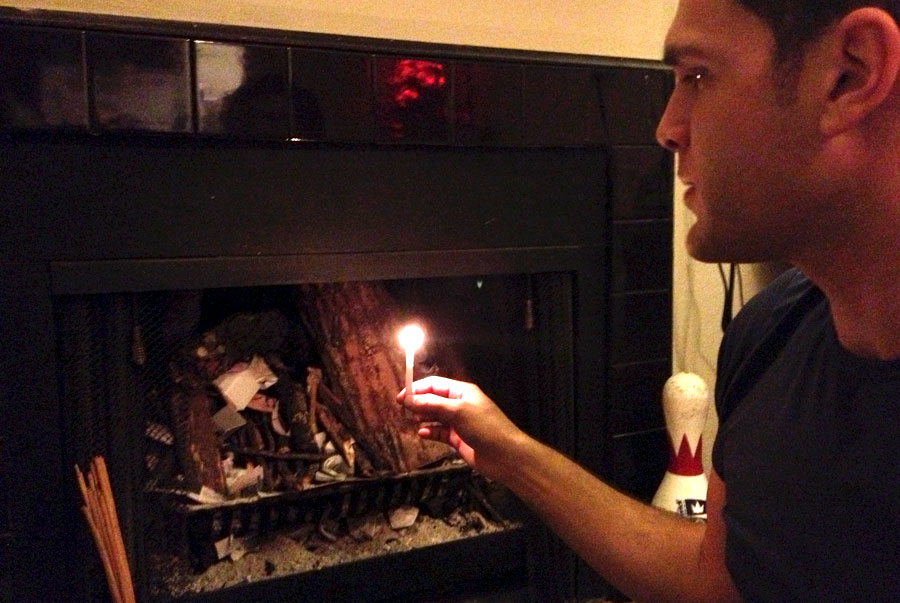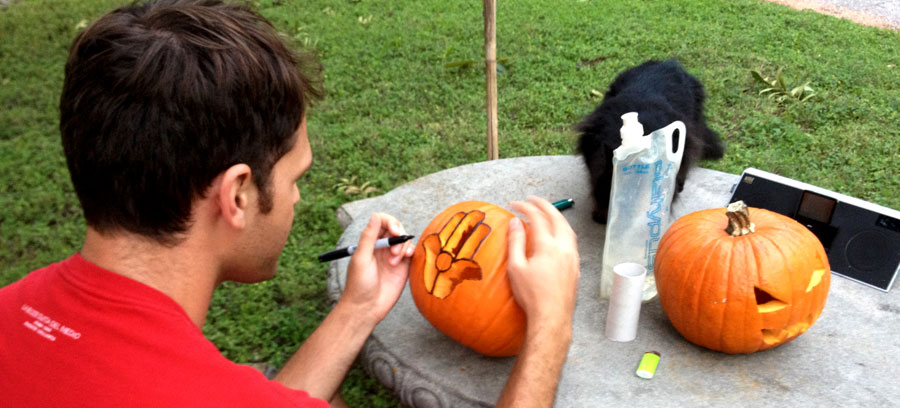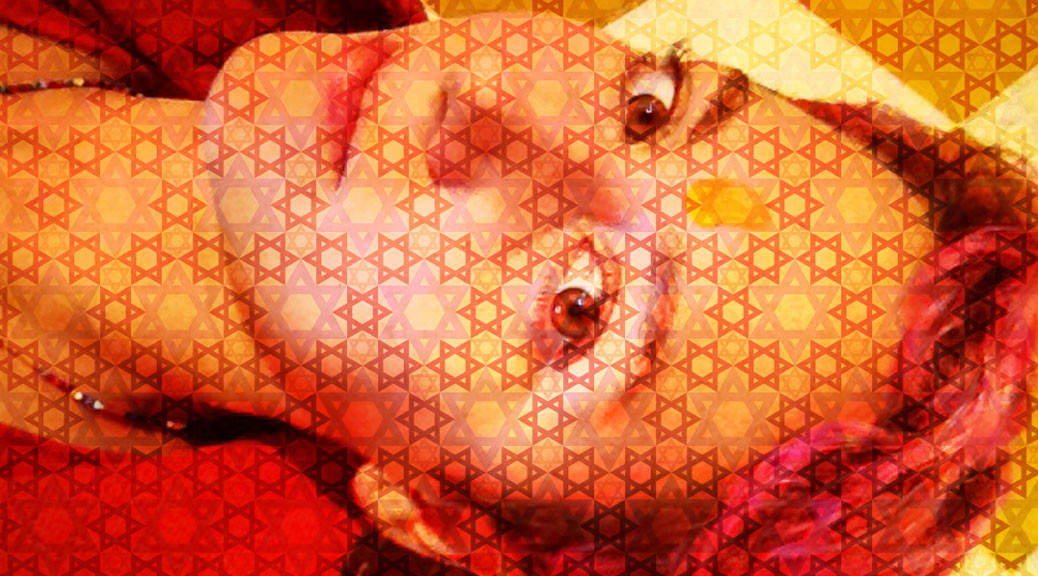I am curious. When I really like someone, and especially when I enter into a romantic partnership with someone, I soak up who they are. I ask them about their life and experiences and I explore new perspectives through their eyes. I encourage their individual passions and join them in those pursuits. I learn about them. And sometimes I continue learning on my own.
Through Yair I found Judaism. Don’t get me wrong, I’m not calling myself Jewish. I’ve never been seriously interested in joining an organized religion. But that doesn’t mean that I don’t find religions fascinating – historically, socially, philosophically.
Yair was raised Orthodox, speaks Hebrew, and still practices some rituals at home. The closer we became, the more comfortable I felt asking him about his religious past. And he began including me in some rituals…lighting candles, smelling spices, drinking wine. He showed me how to write our names in Hebrew and cooked us kugels and cholents.
I have wonderful memories of being beside him as he lit a home-made hanukkiah that we named “log-ukiah” (it was, essentially, a log with candle holes), a fire-side Thanksgivukkah, and sipping wine together to celebrate many a Shabbat. And, as we hit the road together, I became the enthusiastic instigator of the kiddush – breaking out the necessary equipment (candles, matches, wine and glasses, and sometimes a jar of cloves) and then positioning myself across from Yair so that I could enjoy his smiling, sing-song prayers and watch the light in his eyes. Such wonderful, peaceful memories will be cherished.
My experience of Judaica could have stopped there and ceased when I moved out of the RV. But I still had curiosities, and I have family ties, and I felt comfort in a growing understanding and desire to delve into a rich history.
So, on my out of the RV I asked Yair if I could borrow a rather large book I had thumbed though: “Jewish Literacy” by Rabbi Joseph Telushkin.
Within my first month back in Austin I had finished the book, taken notes, and done some extra research on the side.
I felt inspired and my perspective transformed many times while reading. I’ve copied some of my notes below and I hope you can find some interesting information or inspiration for yourself in them.
I don’t know what the future holds for me and Judaism…but I expect my curiosity is here to stay.




“JEWISH LITERACY” NOTES & QUOTES
“God shall be what God shall be to that person. He cannot be adequately described to others.”
“…for most people, faith and doubt exist independently of anything that God does.”
Martin Buber: Every person can find his own way to God so there is no reason to model the behavior of someone else.
Franz Rosenzweig: “Not Yet” – not ready to _ yet. As in someone who does not wear tefillin should be viewed as someone who is not spiritually ready to yet. This perspective unites across denominational lines. Transforms blame or frustration into pity or compassion.
“The classic test of repentance is to see how a person acts when placed in exactly the same circumstances in which he previously sinned.”
“How can you tell when a sin you committed has been pardoned? When you no longer commit the sin.”
“You shall not abhor an Egyptian, for you were a stranger in his land.”
At the Passover Seder a drop of wine is spilled for each of the ten plagues – a symbolic statement of a diminution of joy at the Egyptian’s suffering.
“You shall not take his name in vain” means “you shall not use God as your justification in selfish causes.”
The Sabbath is to be made a holy day – not a resting day.
“He who is merciful when he should be cruel, will in the end be cruel when he should be merciful.”
Rabi Tarfon: “It is not your obligation to complete the work (of perfecting the world); but you are not free to desist from it either.”
The high court of Sanhedrin asked much of its members, including that they have children. “The rabbis believed that the experience of raising children makes a person more sympathetic and humble.”
Rav Kook: “The Second Temple was destroyed because of causeless hatred within the Jewish community. Perhaps it will be rebuilt through causeless love.”
“Even the transgressors in Israel are full of good deeds as a pomegranate is filled with seeds.”
Anne Frank: “How wonderful it is that nobody need wait a single moment before starting to improve the world.”
Bernard Baruch: “Every man has a right to his own opinion. But no man has a right to be wrong in his facts.”
Who says your blood is redder? (It is not okay to murder an innocent to save another’s life).
Reb Aryeh’s love for his wife: “My wife’s feet are hurting us.”
“The gossiper stands in Rome and kills in Syria.”
Israel Salanter: “Normally we worry about our own material well-being and our neighbors souls; let us rather worry about our neighbors material well-being and our own souls.”
One is forbidden to eat before he has fed his animals.
Jews generally do not hunt. Heinrich Heine: “My ancestors did not belong to the hunters so much as the hunted, and the idea of attacking the descendants of those who were our comrades in misery goes against my grain.”
Parents should teach their children self defense via: the Torah, how to earn a living, and how to swim.
Whoever saves a single life, it is as if he saved an entire world. (Because the person saved will likely go on to have children who will have their own children and on and on). Thus, if one person kills another, it is as if a whole world has been lost.
Guests may stay three days: “On the day a guest arrives a calf is slaughtered in his honor; the next day, a sheep, the third day, a fowl, and on the fourth day, he is served just beans.”
“If your wife is short, bend over to hear her whisper.”
God is in a higher plane than anyone giving an evil order – those orders should not be followed. “There is no messenger in the case of sin.”
Louis Brandeis: “The irresistible is often only that which is not resisted.”

Being a curious soul and learning from sages of the past and presesnt makes you a wise and discerning person.
You did benefit from your time with Yair, even if he turned out to be a little meshuganah. Better to discover his difficulty in commiting to relationships now than later.
Thanks Madeline. Today, while going through some photos, I found a few more quotes that I meant to include in this post which seem to apply (I suppose many of these bits of wisdom could apply to nearly any situation).
Ben Zoma:
“Who is rich? He who is happy with what he has.”
“Who is wise? He who learns from every man…Who is a hero? He who controls his passions.”
Hillel:
“If I am not for myself, who will be for me? But if I am only for myself, what am I? And if not now, when?”